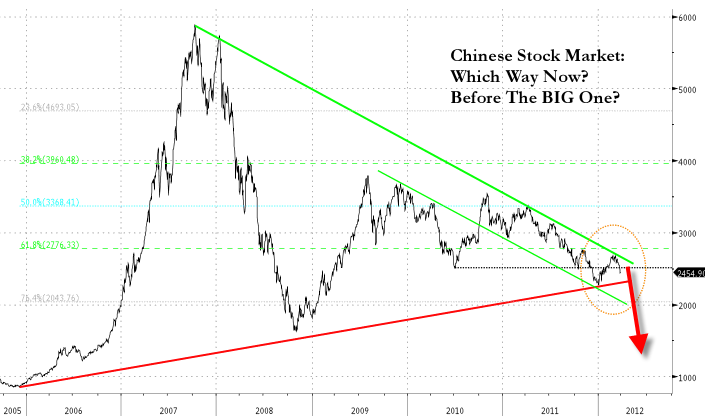– Is The Chinese Stock Market About To Crash? (ZeroHedge, Mar 30, 2012):
“The eternal optimists would have us all believe that China will awaken from its slumbers amid a blaze of new, debt-fuelled spending initiatives and so buy up all the goods we find so hard to sell at home (without offering a substantial concession in price)” is how Sean Corrigan begins his assault on the non-reality that is China’s ‘save-the-world’ protagonists. It is worth noting, however, that those who actually invest in the place seem to be too busy selling their equities to pay much attention to the Panglossians and Polyannas. With a 10% slump in the past 12 sessions in the main indices (retracing a major fib interval of the 2012 rally), there seems little enthusiasm there for clinging on in the hope that the PBOC will bail anyone out – and the wedge is closing on something big in the chart. Plain vanilla economics might well be correct in telling the bulls that they may rely on a Zhou Xiaochuan Put to spare them too much future pain, but the law of the political jungle, red in flag, tooth, and claw, may well dictate otherwise. As we write, it seems beyond dispute to say that the Chinese hierarchy is battling it out behind closed doors to determine the long term future of the regime and, by implication, the direction of the entire nation. In such momentous times, we would perhaps be foolish to think that the routine application of short?term countercyclical policy will bear overmuch weight in their counsels. Simply out, there is too much political infighting for any large-scale action to be taken as “Having moved against the state-capitalist left of old man Jiang and his Chongqing bruisers, surely the last thing Hu & Co. would want in their final months in office would be to unleash another oligarch?enriching orgy of speculation of the kind such a mass stimulus would be almost bound to foment.”
Anecdotal evidence continues to belie the highly suspect official statistics upon which so many blind macromancers routinely base their case. Growth in Shanghai port traffic has slowed to a virtual crawl – under 4% YOY – as have rail freight ton?miles ? a sub?5% increase in the first two months which is less than half the trend rate from before the crisis – while electricity use for the first two months (unseasonably cold ones full of residential heating demand, at that) was only 6.7% above the like period in 2011, the smallest increment (excluding the Crash itself) in a decade.
Then we had the salutary revelation that the CCP has not, after all, managed to suspend the working of the same economic laws which are crushing Europe – i.e., they have not been able to order away the effects of a monetary dearth which is steadily eating away at the shaky foundations erected during an earlier glut and sizzling through the overextended balance sheets this spawned with the vigour of fluoroantimonic acid.
Thus, when the NBS announced that the trajectory of larger firm revenues had decelerated sharply from the 30% YOY rise of HI?2011 to February’s 13.4% (the slowest, ex?crisis, in a decade), we might have guessed that profits would fall 5.2% YOY (fall!)– a far cry from the earlier period’s growth in the high?20s. More worryingly, accounts receivable and finished product inventories were also both up 18% ? swelling faster than sales and so implying negative cash flow prevails across the board. Negative cash flow means that even such profits as there may be are more a virtual artefact of accounting convention than the sort of filthy lucre you can actually spend.
Even this does not tell the whole story, for while expanding production volumes and an administered price hike helped both oil & gas and the utility industries improve their tallies (if not, for the first of these, anything like as rapidly as before) and if agriculture also benefited from higher prices, by contrast, chemicals, metals processing, machinery and equipment making, and electronics and communications all saw income shrinking – to the point of extinction for the nation’s steel makers who are responsible for half the planet’s output.
Even if we dismiss the wilder rumours swirling about the offshore websites and the fringes of the blogosphere, it is painfully clear that something very unusual and potentially disruptive is afoot. Given our overdependence on the myth, as much as on the reality, of a China rising inexorably and uninterruptedly to a resource?hungry world primacy over the next decade or two, the interplay of factional political infighting with potential economic meltdown could be the defining influence on the world’s affairs in general, much less on the enthusiasms of those active in its financial market playground, in the coming months.
Chart: Bloomberg
